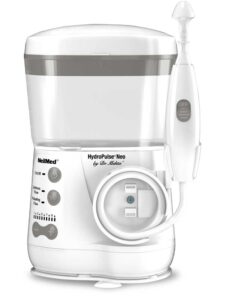What Do Medicines do for Allergy?
What do medicines do
Medicines having antihistamines are effective at treating allergies.
“When the pollen meets up with the IgE antibodies in the nose, histamine is released by histamine-containing cells,” said Dr. Norman, head the Maryland Chapter of the Asthma and Allergy Foundation of America.
Histamine is what causes the swelling, itching and dilation of the blood vessels. Antihistamines block the body’s response to histamine, Norman said.
Antihistamines such as Claritin or Zyrtec or Xyzal may give relief.
Cortisone nasal sprays such as Flonase and Becanose help many persons.
Singulair, a chemical that blocks allergic reactions and swelling, also can be used to reduce allergic symptoms too.
Allergy medication can be delivered directly to the nose as a spray. Astelin and Astepro are two such products, another is Patanase.
When you use pulsatile irrigation for your allergy, you wash out the pollen and the dust. You also wash out the IgE that makes the allergic reaction in the first place. Try using the Hydro Pulse before you go into the garden. With the IgE washed out you may not have symptoms.
What can I do about sleep
One of the worst symptoms of allergy is poor sleep. The nose is stuffy, the sneezing, the itching- all combine to rob you of sleep. This is not to be taken lightly. Dr S Dakumanu of Pulmonary Medicine at Hershey Penn has reported significant daytime sleepiness when the allergy – allergic rhinitis is severe. This can be a significant factor in industrial and auto accidents.
When you see your doctor about your morning sneezing, be sure to ask about what to do for sleep. Some doctors recommend Benadryl. This is an antihistamine that has a side effect of drowsiness. Other helps are melatonin to set your sleep clock and Vick’s inhaler to open the nose.
What are ten things that help?
1. Be sure to dust proof your bedroom
2 Avoid getting chilled
3.Drive with windows closed and air conditioning on.
4. Change clothes when you come into the house because there is pollen on the clothing.
5. Keep windows closed, especially in the bedroom, if you can.
6. A hepa air filter in the bedroom can make a significant difference. Remember, good sleep is an allergy fighter.
7 Try the over the counter allergy meds. It is difficult to tell which is best for which person. Note, Benadryl is best at night because it does help you sleep.
8. When you use Hydro Pulse Nasal/Sinus pulsatile irrigation, you not only wash out the pollen and dust, but you also wash out the IgE that your body makes that reacts with the pollen to make allergy.
9. At Allergy Buyers Club they have experienced persons to answer your allergy questions. Go to www.allergybuyersclub.com
10. If the OTC stuff fails, ask your doctor about the cortisone or allergy type nasal sprays.
Note. Never use an ionizer for dust removal. This irritates the nose and chest.
Note: If you are going to the doctor for allergy testing –whether by skin test or drawing blood for testing, do not use Hydro Pulse irrigation, because this will lower the IgE in your blood as well as in your nose.
To reduce your intake of drugs, start the Hydro Pulse Nasal/Sinus Irrigation early in the pollen/allergy season. This Saline Wave Irrigation keeps the cilia moving at normal speed, as well as removing pollen/dust and lowering the IgE on the nose and the blood. Do not irrigate the day before or the day of any allergy testing, but do continue if you are receiving desensitization.

